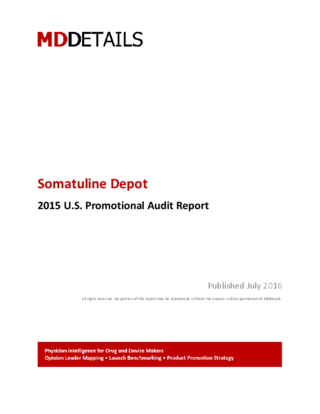Somatuline Depot 2015 report
Somatuline Depot 2015 U.S. PROMOTIONAL AUDIT REPORT
Published July 2016 • 27 Pages
The 5 Key Questions Addressed by this Report:
- How many physicians were reached by Somatuline Depot through personal promotion in 2015 and how does this compare to its peer set in the Acromegaly and Neuroendocrine Tumors markets?
- What promotional mix was leveraged (e.g., sales rep detailing, physician education, and paid speaking) and what was the median spend on each type of activity?
- How does Ipsen’s depth of coverage vary within key specialties (e.g., Hematology/Oncology, Endocrinology, Medical Oncology, Internal Medicine, and Radiation Oncology) and how does this compare to its peers and the overall set of rep-accessible physicians?
- How often are physicians receiving paid meals for Somatuline Depot throughout the year (e.g., monthly, quarterly, annually)?
- Who were the most detailed prescribers and top paid speakers/consultants for Somatuline Depot in 2015?
Data Sources and Methodology:
- MDDetails leverages company-reported financial transaction data disclosed through CMS Open Payments. This data set captures all transfers of value (e.g., speaking fees, consulting fees, travel, education, and meals) made on behalf of a drug or device manufacturer to a physician. Currently, 30 months of longitudinal data is available – covering payments to more than 800,000 U.S. healthcare professionals.
- Over 3,600 paid interactions across 2,100 physicians made on behalf of Somatuline Depot were carefully examined to support our analysis. In addition, interaction data from 3 peer products (e.g. Sandostatin LAR Depot, Signifor, and Somavert) was leveraged to provide benchmarking and market insights.


